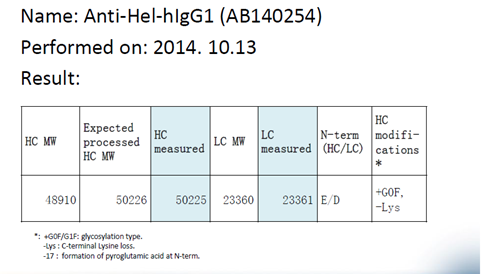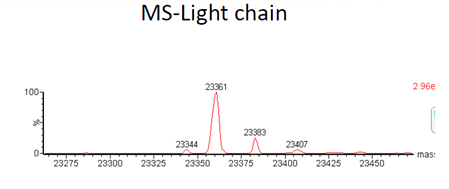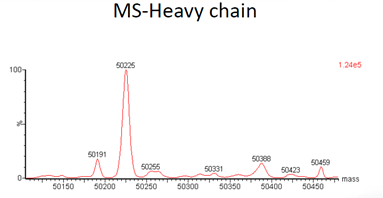Not all applications have been validated in our lab but have been validated by customers.
C0001 – Human IgG1, kappa isotype control is by far the most commonly used human IgG isotype control that we offer. This is considered a standard human IgG1 kappa control and is glycosylated, as most antibodies would be in their natural state.
C0020 – Human IgG1 (D265A), kappa isotype control is human IgG1 with a mutation in the heavy chain that reduces FcR binding.
Unless you have developed a non-glycosylated or D265A mutated version of human IgG1 antibody, it’s most likely that Human IgG1, kappa isotype control (catalog # C0001) would be the most appropriate.
What is the allotype of C0001?
The allotype of our C0001 is G1m1, the same sequence as most therapeutic antibodies.
Are the isotype controls Fab inert?
We have not run any in-house experiments to verify if the isotype controls are Fab inert.
What is the difference between your human IgG4 isotype controls?
C0004 is the wild-type human IgG4 isotype control, while C0045 includes S228P hinge stabilizing mutation.
Since we are planning to use the material in vivo, it would be helpful to know in what other mouse strains it has previously been tested including dose and dosing period. Do you have that type of information that you can share ?
For Mice: Any of the commonly used mouse strains should be fine. Here are some of the strains we have used: NOD/SCID, SCID/Beige, NPG and C57BL/6.
For Dosage: Dose ranges are typically from 1-10mg/kg, most use 3.5 or 4mg/kg, i.p. or i.v. up to 4 weeks.
Regarding C0002 and C0004: If they are human antibodies, why is the host species mouse?
These human IgG isotype controls are chimeric monoclonal antibodies in which the v-gene is from mouse and the constant region is human.
How stable is the antibody at 4°C?
We have not run any stability tests at 4°C, however, the antibodies should be stable at 4°C for a few weeks. We normally recommend aliquoting small vials and storing them at – 80C. The antibodies don’t contain any stabilizers or preservatives so freeze/thaw cycles should be limited to as few as possible.
Have you characterized the epitope for the isotype controls? Do you have sequence information for the entire IgG molecule that you can share ?
Unfortunately, we don’t have any information about the epitope of any control antibodies. We have the AA sequences but can’t share with clients since anyone can make it with the sequence.
Does C0001 contain any rodent pathogens?
No. Our isotype controls are recombinantly expressed. We used cGMP-banked CHO-S cells (A13696-01) from Invitrogen and the final products have been filtered using a 0.22 um filter from Millipore (SLGP033RS | Millex-GP Syringe Filter Unit, 0.22 µm). Therefore, theoretically there should be no rodent pathogens.
[Note] Idexx offers IMPACT 1 and 2 test panels to test for rodent pathogens.
Have you verified/characterized the glycosylation status of your human IgG1 kappa control antibody (C0001-1)?
Yes; see below.



Is there any cross reactivity with mouse lysozome?
We have not seen any cross reactivity. Mouse and chicken lysozyme just display at 54.7% sequence identity. In addition, our IHC data confirmed that the background is VERY clear for our isotype control antibodies.
Do all of your isotype controls use the same antigen recognition sequence?
Yes, our isotype controls use the same antigen recognition sequence (v-gene from mouse hybridoma) with just the IgG FC backbones changed.
Do you have any data on C0005 Mouse IgG1 cross reacting with mouse tissues or proteins?
No. But since our isotype control antibodies specifically interact with hen egg lysozyme, which is quite different to human and mouse lysozyme, it should not have cross reactivity to human or mouse tissue and proteins. Our isotype control antibodies share the same variable region sequence, therefore all bind to the same epitope on Hen Egg Lysozyme.



